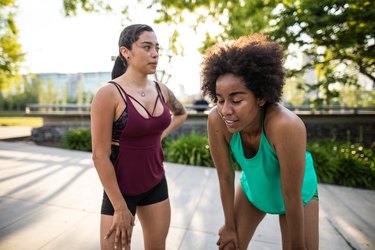
When working out (and sweating buckets!) in the blazing sun, you sometimes can't help but wonder, "Do you burn more calories in the heat?"
It's possible, but any fat-burn-bump is likely small. And most importantly, exercising too hard in the heat comes with major risks.
Video of the Day
Video of the Day
When Exercising in the Heat Can (and Can't) Burn More Calories
How does temperature affect calories burned? Well, when you're exercising or running in hot weather, your cardiovascular system has to work overtime to keep your core body temperature from shooting up too high, says Dennis Cardone, DO, a sports medicine physician at NYU Langone Health. Any time your body has to work harder, you burn more calories.
So, if you do the exact same workout two days in a row, once when it's cool and crisp, and the next when it's hot and humid, it's quite possible you'll burn more calories on the second day.
That said, when you exercise in hot temperatures, you rarely are able to run as fast, lift as much and perform quite as well as you can in cooler temps. (It's not a matter of willpower — it's just how the human body works.) That means you might not actually burn as many calories in hot temperatures as you do in less-extreme weather, he says.
Another fun fact: No matter how many calories you burn when exercising in the heat, hot-weather workouts tend to shift your body from breaking down fat to breaking down carbs for calories, according to an August 2020 Nature Metabolism review. That may be because carbs fuel your body more quickly than fat does.
Also, while exercising and running in the heat can lead to an immediate drop in the scale, don't be fooled: If you end a workout weighing less than you did when you started, it's not fat loss that's moving the scale, it's water loss. (More on this below.)
So, does working out in the heat burn more calories?
The bottom line of the "do you burn more calories when it's hot" debate is maybe, but it's likely not enough to make a real impact in your weight-loss results. And it's definitely not worth making yourself miserable or pushing yourself toward heat-related illnesses.
Warning
Always listen to your body and stop exercising in the heat if you feel any nausea or dizziness or have pale or cold skin with goosebumps. These are all possible signs of heat exhaustion, according to the Mayo Clinic.
4 Must-Follow Tips for Working Out in the Heat
Higher calorie burn or not, there's a good chance you plan on continuing your fitness routine during the warmer months of the year. With that in mind, here some safety tips to consider when running or exercising in the heat:
1. Hydrate
When you exercise in hot conditions, you're going to sweat. That's why the Academy of Nutrition and Dietetics suggests weighing yourself before and after activity to see how much water weight you lost through sweating.
FYI, to prevent dehydration, your goal is to drink enough during your workout that you don't lose any weight between your warm-up and cool-down.
But if you do, the academy recommends drinking 2 to 3 cups of water for each pound of weight you've lost.
Warning
Signs of dehydration include headache, confusion, fatigue, lightheadedness, chills and dark-colored urine, according to the Cleveland Clinic. Stop exercising and hydrate if you experience these symptoms.
2. Dress for the Weather
Sweat-wicking clothing can help your body more efficiently cool itself by allowing the sweat on your skin to evaporate.
Choose light-colored options whenever possible, since they'll help reflect, rather than absorb, rays from the beating-down sun.
Sweat-Wicking Workout Clothes We Love
- Smartwool Run Targeted Cushion Low Ankle Socks ($18, Smartwool.com)
- Lululemon Track That Mid-Rise Lined Shorts ($68, Lululemon.com)
- Tracksmith Session Shorts ($68, Tracksmith.com)
- Brooks Dare Crisscross Run Bra ($33, Brooksrunning.com)
- Patagonia Capilene Cool Daily Shirt ($35, REI.com)
- Under Armour Tech 2.0 Short-Sleeve T-Shirt ($20, Amazon.com)
3. Set Your Schedule
If you can, do any outdoor exercises in the early morning or later at night when the temperatures have cooled down.
If you're working out in a gym with air conditioning, the time of day is not as critical. Just make sure to hydrate before, during and after physical activity.
4. Give Your Body Time to Adjust
When planning any physical activity during the hotter months, stick to short, low-intensity workouts, at least in the beginning. This will help your body get used to the warmer weather, per the Cleveland Clinic.
But once your body does adjust, that doesn't mean you have to do long or hard workouts. You may still need to take it easy when exercising in hot weather.
Was this article helpful?
150 Characters Max
0/150
Thank you for sharing!
Thank you for your feedback!